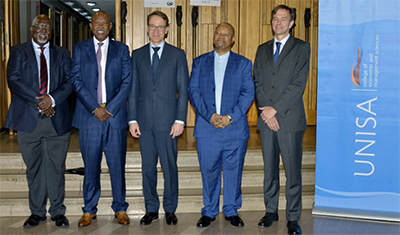
The largest provider of business education in Africa and one of the largest in the world

Prof Thomas Mogale (Executive Dean, College of Economic & Management Sciences, Unisa), Lesetja Kganyago (Governor, South African Reserve Bank), Dr Jens Weidmann (President, Deutsche Bundesbank), Prof Mandla Makhanya (Principal & Vice-Chancellor, Unisa) and HE Martin Schäfer (Ambassador of the Federal Republic of Germany to South Africa, Lesotho and eSwatini)
Price stability is the best contribution a central bank can make to enhance social welfare and to support sustainable growth, Dr Jens Weidmann, president of the Deutsche Bundesbank, said during a public lecture hosted by the College of Economic and Management Sciences (CEMS) at Unisa.
Weidmann delivered the lecture on the role of the central bank in a modern economy from a European perspective on 12 February 2019 during a short visit to South Africa and Namibia. The purpose of the visit was to foster international relations between the Deutsche Bundesbank, the South African Reserve Bank (SARB) and the Bank of Namibia. During his stay, he met both central banks and the governments of South Africa and Namibia.
He said many people in advanced economies have come to question the role of an independent central bank in a modern economy. Superpowers were often attributed to central banks as they struggled with the fallout from the financial crisis. A successful crisis response raised expectations, and with them came disappointment and discomfort.
According to Weidmann, most economists agree that, in general, monetary policy is neutral in the long run. It can mitigate the cyclical fluctuations of growth and unemployment, but it cannot steer an economy onto a permanently higher growth path, nor can it permanently reduce joblessness to below the natural rate of unemployment. Structural unemployment, for example, can only be addressed by economic policy measures, he said.
He argued that there is consensus in economic thinking around the world today that price stability is the best contribution a central bank can make to enhance social welfare and to support sustainable growth.
Weidmann also warned against the printing of money by central banks in order to finance public expenditures. This posed a permanent temptation to governments, as they could use the printing press to finance their spending. Giving in to this temptation led to some of the most terrible episodes of hyperinflation, such as in Venezuela today, in Zimbabwe a decade ago, but also in Germany in the distant past, he said.
Referring to the Great Depression in 1930, he argued that history has taught that deflation, a general, sustained and self-reinforcing decline in the price level, can be devastating for the economy.
Sometimes central banks have to take unpopular decisions. "This gives us all the more reason to continuously explain to the people, in a comprehensible way, why our work is nevertheless beneficial for society," he said.
Knowledge about the central bank and monetary policy has a positive impact on trust in the central bank. "People's trust gives us scope to take decisions that are not always popular in the short run."
Effective monetary policy communication relies on people having a basic grasp of concepts such as inflation and interest rates. Ensuring the public has a basic knowledge of these concepts is important for the success of central banks.
The Bundesbank has been strongly engaged in the field of economic education. "Our main aim is to enhance the public's knowledge about the role of central banks, and the Bundesbank in particular."
Click here for Dr Weidmann’s complete speech.
* By Ilze Crous, Communication and Marketing Specialist, College of Economic and Management Sciences
Publish date: 2019-02-18 00:00:00.0